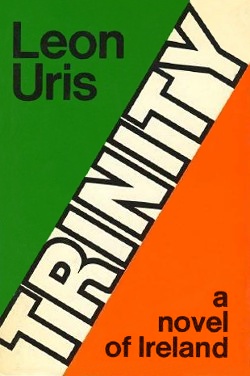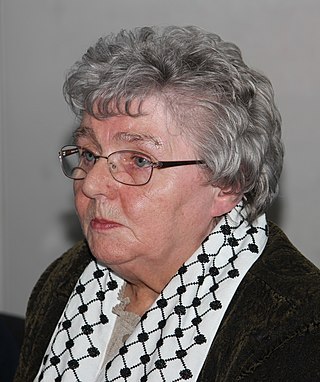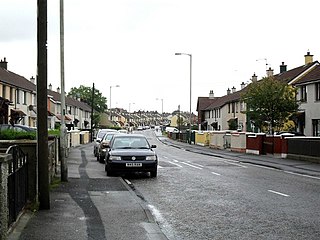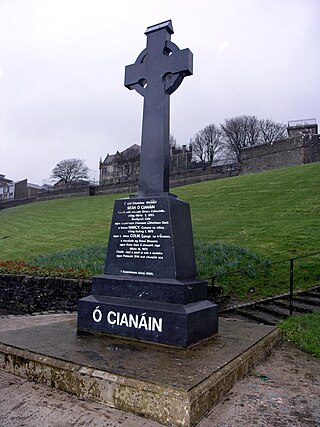
Trinity is a novel by American author Leon Uris, published in 1976 by Doubleday. It spent 21 weeks atop The New York Times Best Sellers list in 1976 and 14 weeks in 1977.

The Bogside Artists are a trio of mural painters from Derry, Northern Ireland, consisting of brothers Tom and William Kelly, and Kevin Hasson. Their most famous work, a series of outdoor murals called the People's Gallery, is located in the Bogside neighbourhood of Derry and depicts the events surrounding sectarian violence and civil rights protests in Northern Ireland during the Troubles.
The Bogside is a neighbourhood outside the city walls of Derry, Northern Ireland. The large gable-wall murals by the Bogside Artists, Free Derry Corner and the Gasyard Féile are popular tourist attractions. The Bogside is a majority Catholic/Irish republican area, and shares a border with the Protestant/Ulster loyalist enclave of the Fountain.

Free Derry was a self-declared autonomous Irish nationalist area of Derry, Northern Ireland that existed between 1969 and 1972 during the Troubles. It emerged during the Northern Ireland civil rights movement, which sought to end discrimination against the Irish Catholic/nationalist minority by the Protestant/unionist government. The civil rights movement highlighted the sectarianism and police brutality of the overwhelmingly Protestant police force, the Royal Ulster Constabulary (RUC).

Free Derry Corner is a historical landmark in the Bogside neighbourhood of Derry, Northern Ireland, which lies in the intersection of the Lecky Road, Rossville Street and Fahan Street. A free-standing gable wall commemorates Free Derry, a self-declared autonomous nationalist area of Derry that existed between 1969 and 1972.

The Battle of the Bogside was a large three-day riot that took place from 12 to 14 August 1969 in Derry, Northern Ireland. Thousands of Catholic/Irish nationalist residents of the Bogside district, organised under the Derry Citizens' Defence Association, clashed with the Royal Ulster Constabulary (RUC) and loyalists. It sparked widespread violence elsewhere in Northern Ireland, led to the deployment of British troops, and is often seen as the beginning of the thirty-year conflict known as the Troubles.

Mary Margaret Nelis, is an Irish former politician who was a Sinn Féin Member of the Northern Ireland Assembly (MLA) for Foyle from 1998 to 2004.

John Mitchel McLaughlin is an Irish Sinn Féin former politician who served as Speaker of the Northern Ireland Assembly from 2015 to 2016, becoming the first Nationalist speaker of the Assembly.

The Showgrounds is a football stadium in Coleraine, County Londonderry, Northern Ireland. It is the home ground of Coleraine F.C. The stadium holds approximately 3,500 with the stadium consisting of a mix of terracing and seating.
Murals in Northern Ireland have become symbols of Northern Ireland, depicting the region's past and present political and religious divisions.

Creggan is a large housing estate in Derry, Northern Ireland, on a hill not far from the River Foyle. It lies on the townlands of Ballymagowan and Edenballymore.

Pat Ramsey is a retired Social Democratic and Labour Party (SDLP) politician from Derry, Northern Ireland. He is a former Mayor of Derry, and was a Member of the Northern Ireland Assembly (MLA) for Foyle from 2003 to 2015, when he stood down. He is the current SDLP Spokesperson for Employment and Learning, and is Chief Whip of the Party. He is a member of several All-Party Groups, such as Diabetes, Learning Disability, and Pro-life.
Patrick Laurence Doherty, better known as Paddy 'Bogside' Doherty, was a Northern Irish activist from Derry, known for his activism in rebuilding the city after The Troubles.
The Derry Citizens' Defense Association (DCDA) was an organisation set up in Derry in July 1969 in response to a threat to nationalist residents from the Royal Ulster Constabulary (RUC) and civilian unionists, in connection with the annual parade of the Apprentice Boys of Derry on 12 August. This followed clashes with the RUC in January and April 1969, which resulted in widespread violence. The DCDA played a prominent role in co-ordinating the area's residents in the Battle of the Bogside, and was the effective government of the self-declared Free Derry from August to October 1969. Its leaders included Seán Keenan, Paddy Doherty and Johnnie White. Keenan and White were well-known republicans.

Seán Keenan was an Irish republican from Derry, Northern Ireland. His father Seamus Keenan was a Quartermaster in the Irish Republican Army (IRA).

Phil O'Donnell, was a volunteer in the 2nd Battalion, Derry Brigade of the Provisional Irish Republican Army and a founding member of Saor Uladh from the Bogside area of Derry, Northern Ireland.
The city of Derry, Northern Ireland, was severely affected by the Troubles. The conflict is widely considered to have begun in the city, with many regarding the Battle of the Bogside in 1969 as the beginning of the Troubles. The Bloody Sunday incident of 1972 occurred in Derry, in the Bogside area.

Brigid Makowski was an Irish Republican activist and politician from Derry, Northern Ireland. A member of Clan na Gael in the 1960s, she became especially politically active following the start of the Troubles in 1969. Following the split in Sinn Féin that same year, she sided with Official Sinn Féin and formally joined the party in 1970. However, following the declaration of a ceasefire by the Official Irish Republican Army in 1974, Makowski broke from the officials and helped found the Irish Republican Socialist Party. In 1981 she was elected to Shannon Town Commission in County Clare and later she became a member of Clare County Council in the 1990s.
The Northern Ireland civil rights movement dates to the early 1960s, when a number of initiatives emerged in Northern Ireland which challenged the inequality and discrimination against ethnic Irish Catholics that was perpetrated by the Ulster Protestant establishment. The Campaign for Social Justice (CSJ) was founded by Conn McCluskey and his wife, Patricia. Conn was a doctor, and Patricia was a social worker who had worked in Glasgow for a period, and who had a background in housing activism. Both were involved in the Homeless Citizens League, an organisation founded after Catholic women occupied disused social housing. The HCL evolved into the CSJ, focusing on lobbying, research and publicising discrimination. The campaign for Derry University was another mid-1960s campaign.
Events during the year 2016 in Northern Ireland.












